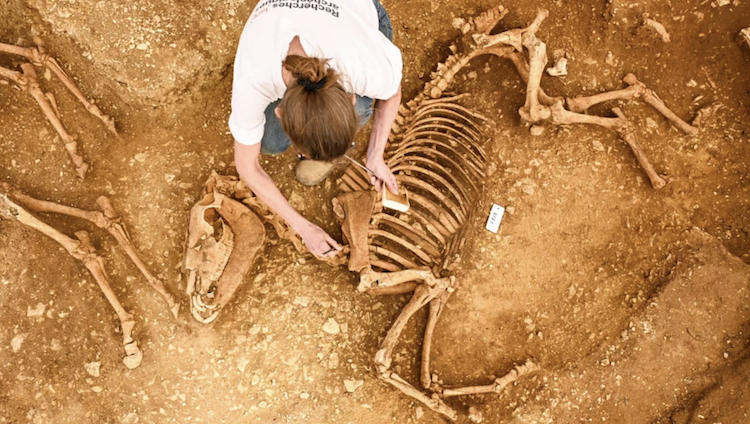Archaeologists in France have uncovered nine “astonishing” graves containing the skeletons of 28 horses that were buried about 2,000 years ago, though their precise cause of death remains a mystery.
Discovered in Villedieu-sur-Indre, a commune in central France, two of the graves have been fully excavated so far, the French National Institute for Preventive Archaeological Research (INRAP) said in a statement.
The horses have been radiocarbon-dated back to somewhere between 100 BC to 100 AD.
Archaeologists found 10 complete horse skeletons in one pit and two in the other, all carefully placed in the same manner lying on their right flank with their heads to the south.
All these horses were buried at the same time shortly after their deaths, archaeologists said after observing the position of the skeletons and the connections between the bones.
Another grave is situated between these two pits but it contains two medium-sized dogs, both lying on their left side with their heads facing west.
Archaeologists have yet to fully excavate the remaining graves but have already identified a total of 28 horses from the skulls and coxal bones that appear on the surface.
However, the horses’ precise cause of death still remains unclear.
Archaeologists have ruled out an epidemic since there are no foals or mares in these graves; all the skeletons are fully-grown stallions aged over four years old. That leaves, archaeologists said, the possibilities that these horses were either killed in battle or as part of a ritual sacrifice.
When these horses died about 2,000 years ago, there was a fortified Celtic settlement known as an oppidum just a few hundred meters away and this location mirrors that of two other similar horse burial sites that archaeologists had previously uncovered in the same region.
Due to this location, they have hypothesized that the horses’ deaths at the sites could be connected to the battles of the Gallic Wars in which Julius Caesar conquered Gaul between 58 – 50 BC.
There may be another explanation, however: ritual sacrifice.
“The hypothesis that these animals were sacrificed as part of a complex ritual, of which only a few scraps remain, must also be considered,” the INRAP statement said.

